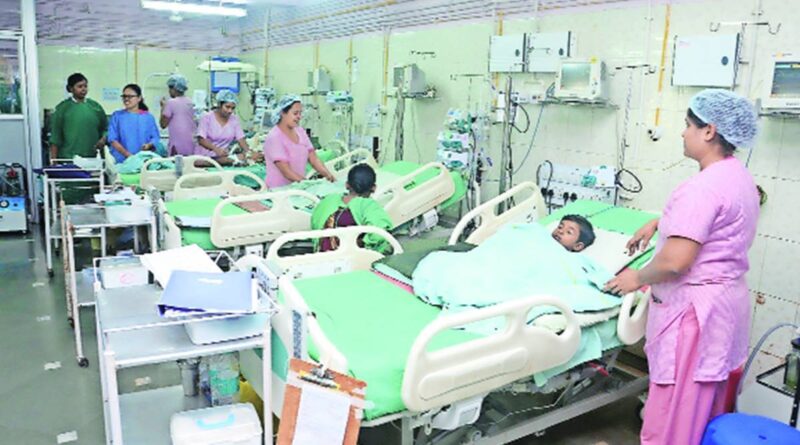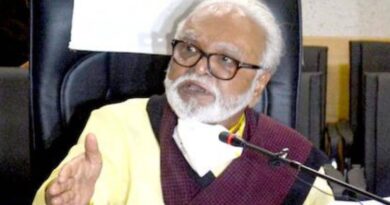Second wave retreating, Bengal draws up plan to tackle possible third wave
Even as the Covid situation in West Bengal is showing significant signs of improvement, the state is wary of lowering its guard and has already shifted its focus to warding off a possible third wave. As a statement of intent, it has already laid out a roadmap in anticipation of a third wave, with focus on children.
The state Health Department has drawn up a blueprint and is in the process of putting the requisite infrastructure in place.
For optimum and effective use of these facilities and resources, medical officers and nursing staff will go through special training under Paediatric Covid Management programme. It will also arrange a modular on-line and off-line training programme, starting June 23 (Wednesday), for medical officers and nursing staff across the state.
On Monday, the state government set up a special 10-member expert committee to “supervise and monitor the evolving situation and suggest suitable interventions for effective management of Covid-19 third wave”.
“Children accounted for around three per cent of the people infected during the second wave. Not more than 200 were hospitalised at a time. Due to thick nasal mucous membrane and the fact that children have more nasal secretion, the virus got washed away before it could reach the target cell. Secondly, as colleges and schools are shut, they had less movement outdoors were, therefore, at lesser risk of exposure to the virus. During the second wave, the fatality was higher in the age group of 31 to 45. One of the reasons for this was that this age group socialised a lot and didn’t take necessary precautions. However, once schools reopen and children start stepping out more, they will be at a higher risk of being infected. Also, the wait continues for a children’s vaccine. Hence, they remain vulnerable going forward,” Dr. Ajoy Chakraborty, Director of Health and Service, told The Indian Express.
To tackle the third wave, the state has planned to protect the children by “escalating in-patient Covid facilities for the younger age group”.
The Health and Family Welfare Department has put together an expert committee to augment PICU (Paediatric Intensive Care Unit), SNCU (Sick Newborn Care Unit), Paediatric HDU beds in the state. It has planned to train human resource to cope with the new challenges apart from upgrading infrastructure, equipment and logistics. The state is also planning to develop six new PICUs in Jalpaiguri, Cooch Behar, Uttar Dinajpur, Purulia, Rampurhat and Diamond Harbour districts. Apart from converting adult wards to into those for paediatric patients, the state is also in the process of procuring oximeters and ventilators, apart from other equipment for critical patients.
On July 14, the Health and Family Welfare Department issued an order stating that the existing PICU/NICU will be utilised for non-Covid services and should not be converted into Covid wards. Around 1,300 existing Covid CCU/HDU beds at adult wards will be equipped with necessary items so that they could be used as Covid PICU.
“Around 1,300 Paediatric ICU beds (PICU) will be arranged at the existing Covid CCU/HDU before the 3rd wave. Such PICU will be set up at all MCHs, all District Hospitals and Sub District Hospitals. Paediatricians from the respective facility will guide and supervise patient management,” read a portion of the order issued by the health department.
According to doctors, even as cases have reduced significantly in the prevailing second wave, counting the dead is important at a time when the state is planning to tackle the third wave.
“If we see case fatality of Covid, it is at 2.2 percent globally, 1.2 percent in India and 1.1 percent in Bengal till date. India has, so far, recorded nearly 3 crore cases, while Bengal has logged nearly 15 lakh. Even when the second wave peaked in Bengal and daily cases numbered nearly 20,000, the number of Paediatric Covid cases were limited to approximately 200. So, we are drawing up a plan assuming that a maximum of 500 patients would require hospitalisation at a time. The numbers are not very high but we don’t want to take any chances. We have to keep aside 5 percent critical care units and 10 percent high dependency units (HDUs) for Covid patients,” Chakraborty said.
According to Health Department officials, the state, for the third wave, needs 250-300 PICUs, which may be increased to 500, and 500 HDUs which may be increased to 1,000, if required. It is also planning to keep 800 (PICU & HDU) beds ready, which may be increased to1,500 when required.
“For infants (less than one year old) we have 68 SNCUs and if SNCU patients turn critical, we have neonatal intensive care units ready and equipped at a few hospitals which could be used in a segregated manner, if need be. We have 26 general beds (40 percent for female and 60 percent for male patients). The ratio will be reversed to make it 60 percent for women. In case of mild and moderate paediatric Covid positive cases, children, who are 90 days to 12 years of age, will be admitted to the Covid female beds where mothers will stay with their babies. Ten thousand such beds have been earmarked,” Chakraborty added.
As per a government order, the NRS Hospital has earmarked 25 beds exclusively for Paediatric Covid cases. Speaking to this newspaper, an official at the hospital revealed that a separate room will be used for this purpose. A toilet is also being built. The room will have two separate corners which will be used as ‘Downing Room’ where doctors can don PPE kits before entering the ward, and ‘Doughing Room’ which they will use after exiting the ward post treatment.
“A total of 25 beds has been earmarked, work on getting them ready has been started. By end of this month, they will be ready,” a staff said.
Apart from NRS, M.R Bangur Hospital, R.G Kar Hospital, ID BG Hospital, Sambhunath Pandit Hospital, Kolkata Medical College, Calcutta National Medical College and Hospital are among few other medical establishments where 25 beds each have been earmarked for paediatric cases.
The state government has also begun procuring 80 paediatric ventilators and oximeters for children in anticipation of higher caseloads among them during the third wave.
“Adult pulse oximeters don’t work on children as their fingers are smaller in size. So, to check their oxygen saturation levels, the health department is buying and distributing oximeters for children. All districts will have dedicated paediatric units with adequate oximeters and ventilators,” added an official.
For proper utilisation of human resources, the health department has prepared a guideline based on which training programmes are being designed. According to the department, the state has an adequate number of paediatricians.
Few non-paediatric doctors will also be trained to manage paediatric cases. SNCU nurses, who are already trained to handle children, will be uniformly placed whenever and wherever required. Every primary tier facility will be linked to the nearest higher tier centre. Round the clock tele-consultation with higher tier facilities will also be made available.
Also, transport facilities from the primary tier to the higher centre will be arranged by the health department.
“It is being said that by the beginning of July, we will tide over the second wave. We may get a gap of three to four month before we are hit by a third wave. If we can create awareness, people follow Covid protocol and we do more vaccination, there’s hope that we’ll be able to push back the third wave by a few more months,” Chakraborty added.
The Centre has also issued comprehensive guidelines for management of Covid-19 in children, including treatment of mucormycosis. Swastha Bhawan has also directed all hospitals to provide with the Weekly Incidence of MIS-C Cases (both for Neonates and Pediatric age group) in a specific excel format as requested by the Union Ministry of Health & Family Welfare.
“Though there is no scientific research to suggest that the third will majorly affect children, one musn’t take any chances. Children below five years of age don’t require masks. However, those aged between 6 and 11 years must wear masks and those aged above, till 18 years, must wear double masks whenever needed,” added another health official.
While the government is making all arrangements on a war- footing, parents are worried about a possible third wave and how it might impact their children. Speaking to this newspaper, Dr. Pavitra Chakraborty, senior consultant (Paediatric), Bhagirathi Neotia Woman and Child Care Centre, said, “If high fever persist for more than three days and isn’t subsiding by any means, one must consider taking the patient to a hospital. There have been many cases where a child was asymptomatic the first time he/she was infected and affected with severe symptoms such as high fever more than three days, rashes and breathlessness the second time. Should such severe symptoms manifest in a child, he/she must be taken to a doctor at the earliest.”
Dr. Somenath Gorain, a paediatrician at Bhagirathi Neotia in Newtown, said the children were mostly asymptomatic during the first wave of the pandemic. In the second wave mild to moderate symptoms were seen in children and they mostly recovered at home and very few with chronic illnesses required to be admitted to PICU beds.
However, he said he is more worried about the MIC-S syndrome than Covid in children. “This virus continues to surprise. There’s a highly likelihood that it will migrate to those who are not vaccinated. Since, children aren’t vaccinated for Covid, they are vulnerable. The Multisystem Inflammatory Syndrome in Children (MIS-C), which is caused by Covid, is keeping us worried. It is a serious Covid complication in children which must be treated on time.
This manifestation was seen mostly one month from the time Covid was at its peak. Most children in their adolescence (around 10) develop this syndrome. It impacts the end organs,” he said.
On June 18, the Union health ministry issued a comprehensive guideline for management of Covid-19 in children and its post effect. A copy of the same has been forwarded to all the medical colleges and hospitals.
Meanwhile, the state government has put together an expert committee, comprising ten members, to track developments related to the third wave. The panel will follow evolving situations arising out of the pandemic and suggest suitable interventions for effective management of the third wave.
Also, to ensure optimum use of available resources, medical officers and nursing staff will go through special training under the Paediatric Covid Management programme. The health department will arrange a modular on-line and off-line training programmes, starting Wednesday, to train the medical staff for tackling new challenges arising out of the pandemic.


